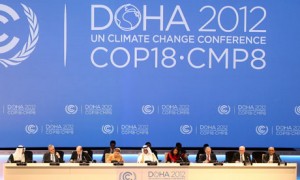Learning from Past Mistakes - Rise of Alianza Independiente de Latinoamerica y el Caribe (AILAC) in Doha
 Climate negotiations have always been very ‘polarized’. It is not just a simple case of developed and developing countries, but rather, the divisions among parties are more strategic and interests driven.
Climate negotiations have always been very ‘polarized’. It is not just a simple case of developed and developing countries, but rather, the divisions among parties are more strategic and interests driven.
In a recent unfolding of things, a new alliance of 5 middle-income economies has emerged at the Doha climate talks. Collectively known as the Alianza Independiente de Latinoamerica y el Caribe (AILAC), the group includes Colombia, Costa Rica, Peru, Chile and Guatemala. The alliance is formed to counter the growing influence of BASIC and ALBA groups of countries, which does not reflect the economic realities of all the countries. The group has garnered support from some major parties such as Mexico and the civil society, who see it as a constructive way forward – “moving from the politics of blame to the politics of responsibility”.
According to Costa Rican negotiator, Monica Araya, AILAC is a partnership of countries that want obligations for all but keeping the changing realities of the world in mind. The idea is for these countries to pursue economic development, without repeating the same mistakes of the developed countries that has caused the problem of global climate change.
The alliance is seen as a balanced negotiation group trying to create a middle ground between countries. It aims to bring a Latin American perspective to the talks, but one that promotes cooperation between rich and poor countries.
Will AILAC be successful in bringing parties to convergence in Doha? Would it be as strong a group in changing dynamics in Doha talks as was its counterpart the Cartagena Dialogue in Cancun? Or will it be just another bandwagon that misses its targets? Only time will tell.




About the author
Farrukh Zaman
Farrukh is a climate activist and researcher from Karachi, Pakistan, where he spearheaded a youth movement on climate change.





